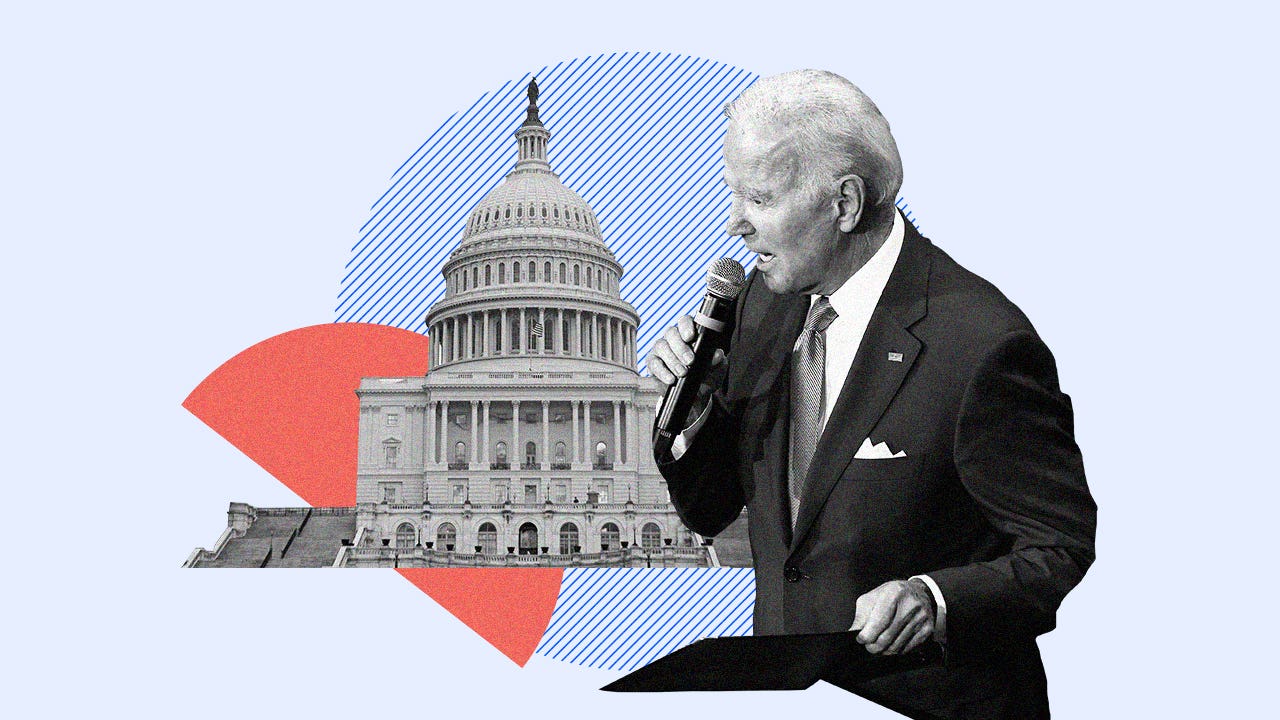Survey: 43% of Americans say their finances are worse now than when Biden was elected

Hit by soaring inflation, rising interest rates and lingering impacts from the coronavirus pandemic, Americans are more than twice as likely to say their finances have gotten worse than better since President Joe Biden’s election, a new Bankrate survey found.
Fewer than 1 in 5 Americans (or 18 percent) say their wallets are better today than they were two years ago, according to Bankrate’s poll. That compares with 39 percent who say their finances are about the same, and another 43 percent who say they’re worse.
Americans’ financial sentiment could be especially crucial leading up to the 2022 midterm elections that will decide which party controls Congress, with seats in both the U.S. Senate and House of Representatives up for the taking. The leaders Americans elect will have key votes on personal finance-impacting policies — decisions that could include what to do about inflation and rising housing or health care costs, as well as how to help businesses and consumers weather a potential recession.
“The midterm elections will be important in terms of defining which party is or isn’t in the political driver’s seat in Congress over the next two years,” says Mark Hamrick, Bankrate senior economic analyst and Washington bureau chief. “If a recession does emerge as many fear and expect, it will again fall to elected officials to prescribe and vote on possible legislative responses. In turn, many of these factors may have impacts going into the next general presidential election.”
- More than 2 in 5 (or 43 percent) say their personal financial situation is worse now than it was before President Biden was elected two years ago, compared with 39 percent who say their finances have stayed the same and 18 percent who say they’ve improved.
- More than half (or 55 percent) of those who say their personal finances have improved give at least a moderate amount of credit to Biden, while 54 percent and 36 percent say the same for Democrats and Republicans in Congress, respectively.
- Nearly 7 in 10 (or 69 percent) Americans who say their finances have worsened say Biden is at least moderately to blame, along with 71 percent and 54 percent blaming Democrats and Republicans in Congress by the same amount, respectively.
- Republicans are more likely to say their finances have worsened (56 percent versus 30 percent of Democrats), while Democrats are more likely to say their wallets have improved.
- Almost a third (or 32 percent) expect their finances to get worse over the next two years, while 42 percent expect their situation to remain about the same and 26 percent expect improvements.
More than 2 in 5 say their personal financial situation is worse today than it was two years ago
Men (at 21 percent) are more likely than women (at 15 percent) to say their finances have improved within two years, as well as younger Americans. One in 4 (or 25 percent) Americans between the ages of 18 and 25 in Generation Z and 22 percent of millennials (ages 26-41) say they have seen improvement, versus 16 percent of Gen X (ages 42-47) and 15 percent of baby boomers (ages 58-76).
The likelihood of saying their finances have worsened shows a similar age divide. Almost half of boomers and Gen Xers (at 46 percent and 47 percent, respectively) say their financial situation has deteriorated since Biden’s election, compared to just 36 percent for both Gen Z and millennials.
Economists will point to the U.S. economy’s sharp improvement over the past two years. Joblessness was nearly two times as high as it is today (6.9 percent in October 2020 versus today’s 3.5 percent). More than 3.7 million people were still missing from the labor force at this time two years ago, most of them women. More than 10.2 million jobs hadn’t been recovered from pandemic-induced cuts, and employers appeared to have an appetite to fill just 6.8 million of them, according to Labor Department data.
But it’s easier to see what’s different today than two years ago: Inflation. A side effect of reduced spending and an ailing economy, price pressures in October 2020 had grown just 1.2 percent from a year ago, a four-year low. But later that year, prices would mount an almost 18-month surge — until eventually hitting a 40-year high of 9.1 percent in June. Even today, annual price gains have only slowed by nearly a percentage point, rising most recently in September by 8.2 percent from a year ago.
Bankrate’s survey reflects just how acutely and extensively inflation chips away at Americans’ wallets.
The typical American household needs to spend $445 more per month to buy the same goods and services as they did in 2021, according to analysis from Ryan Sweet, senior director of economic research at Moody’s Analytics.
Inflation makes it harder for the dollars in Americans’ wallets to go as far as they used to, and the hit to their purchasing isn’t totally dissimilar to taking a pay cut from loss of hours or joblessness — what often happens during downturns. Not to mention, more Americans at any given time might feel the impacts of inflation than they do by joblessness, at least according to the former Federal Reserve Chair Ben Bernanke. The majority (or 93 percent) of Americans in a February Bankrate poll said they’d noticed higher prices, while 74 percent said they were negatively impacted by them.
“The difference between inflation and unemployment is that inflation affects just everybody,” Bernanke said in a May interview with The New York Times. “Unemployment affects some people a lot, but most people don’t respond too much to unemployment because they’re not personally unemployed. Inflation has a social-wide kind of impact.”
For those who say their finances have improved, here’s who they are crediting
Americans who say their finances have improved over the past two years since Biden’s election were more likely to give at least some credit to Biden (at 72 percent), closely followed by congressional Democrats (70 percent), the party that currently occupies both houses by a slim majority.
More specifically, 55 percent give Biden at least a moderate amount of credit, a total that includes 17 percent who give him a great deal of credit. Another 17 percent give him a little credit. That compares with 54 percent who give Democrats in Congress at least a moderate amount of credit, and nearly 1 in 6 (or 16 percent) say those lawmakers helped their finances improve a little.
Meanwhile, a smaller percentage (or 36 percent) credit Republicans in Congress at least moderately. Nine percent say they’re a great deal responsible, and 13 percent say they helped a little bit.
Women whose financial situations improved were among the least likely to credit any Washington policymaker for their good fortunes. Nearly 2 in 5 women (or 42 percent) gave Biden no credit, versus 18 percent of men. At the same time, 56 percent of women say Republicans in Congress played no role in helping, as opposed to 48 percent of men.
Black Americans (at 90 percent) were more likely to give Biden at least some of the credit versus 64 percent of White Americans.
Of the Americans making less than $30,000 a year who saw their financial situations improve over the past two years, 64 percent credit Republicans in Congress, versus 39 percent of those earning at least $80,000 per year.
Of those who say their finances have worsened, here’s who they say is to blame
Yet, Americans were more likely to pass blame to Washington policymakers than give them credit, Bankrate’s poll found.
Slightly less than 1 in 5 (or 19 percent) of the Americans who say their finances are worse today than they were two years ago place none of the blame on Biden for their financial situation. On the flipside, 69 percent place at least a moderate amount of blame on the president. That total includes 48 percent who assert a great deal of blame. Meanwhile, about 12 percent say Biden is only a little at fault.
These Americans are also pointing fingers at the legislative branch. Almost 3 in 4 (or 71 percent) place at least a moderate amount of blame on congressional Democrats. More than half (or 54 percent) place the same amount of blame on Republicans in Congress.
Americans were three times as likely to say Biden was to blame for their worsened finances than Republicans in Congress, at 48 percent versus 16 percent. As for Democrats in Congress, 45 percent said they were a great deal to blame.
Americans with a political affiliation are more likely to blame the opposite party
Bankrate’s survey found Americans’ opinions of their financial situations and who gets the credit or blame depend on one clear factor: Their political ideologies.
Republicans are almost twice as likely as Democrats (at 56 percent versus 30 percent, respectively) to say their finances have gotten worse over the past two years. They’re also less likely than Democrats to say their finances have gotten better (at 15 percent versus 25 percent).
Meanwhile, Democrats (at 74 percent) are more than twice as likely as Republicans (at 29 percent) to give Biden credit for their improved finances. Yet, a larger majority of Republicans (at 93 percent) are more than three times as likely as Democrats (at 30 percent) to pass at least some blame on Biden for their lack of financial improvement. Republicans were 11 times more likely than Democrats to say Biden shares a great deal of blame, at 77 percent versus 7 percent, respectively.
“In our highly polarized political environment, and in the context of a complicated and highly dynamic economic situation, many people naturally gravitate toward assigning blame or credit to elected officials,” Hamrick says. “The reality is much more complicated than that. The causes of high inflation are multifaceted, including forces stretching around the world, not confined to the U.S. or the nation’s capital.”
— Mark Hamrick Bankrate senior economic analyst
About 1 in 3 expect their finances to get worse over the next two years of Biden’s presidency
Americans are more likely to say their finances over the next two years will get worse (32 percent) than better (26 percent), though the largest share of respondents say they expect their finances to remain about the same.
That’s even as economists in Bankrate’s Third-Quarter Economic Indicator poll put the chances of a recession between now and the middle of 2024 at 65 percent.
Younger Americans tended to feel more optimistic than their older counterparts. Gen Z and millennials (at 34 percent each) were nearly twice as likely to have a positive outlook compared to boomers (17 percent). About 1 in 4 (or 26 percent) Gen Xers said the same.
Democrats were also more likely to look to the future positively, at 36 percent, versus 19 percent of Republicans.
As for those who feared they could be even worse off in the future, White Americans were more than twice as likely as Black Americans to expect their finances to get worse (at a respective 36 percent and 14 percent), compared with 27 percent of Hispanic Americans.
Whether it be a potential downturn or continued impacts of inflation, Americans fearing for their financial futures should think about boosting their employability by improving their skillsets, taking advantage of today’s still historically strong job market to negotiate for a raise and finding ways to put back as much money as possible. That could be saving for emergencies and more immediate needs just as much as saving to cover long-term goals such as retirement.
“With only about 1 in 3 Americans saying they believe their personal finances will be better two years from now, something of a bunker mentality may be emerging among consumers,” Hamrick says. “It’s understandable as they’ve been adjusting in response to inflation, which erodes buying power, and in anticipation of possible worsening of the job market.”
Methodology
Bankrate.com commissioned YouGov Plc to conduct the survey. All figures, unless otherwise stated, are from YouGov Plc. The total sample size was 2,000 adults. Fieldwork was undertaken between October 16-18, 2022. The survey was carried out online and meets rigorous quality standards. It employed a nonprobability-based sample using quotas upfront during collection and then a weighting scheme on the back end designed and proven to provide nationally representative results.
Why we ask for feedback Your feedback helps us improve our content and services. It takes less than a minute to complete.
Your responses are anonymous and will only be used for improving our website.
You may also like

Survey: Nearly 3 in 4 Americans have a financial regret





